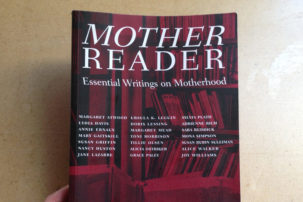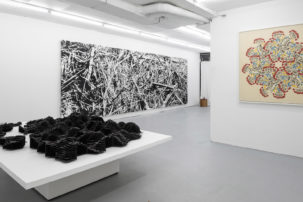Moyra Davey’s single-channel videos are often described as “essayistic.” While a concise definition of this mutable moving-image form is hard to come by, an evocative one was given by French filmmaker Jean-Pierre Gorin, who wrote: “The film essay is a strange beast. To simply define it as a form that foregrounds a voice and sketches a persona falls short. At the core of all essays is an interest so intense that it precludes the possibility of naming it simply and efficiently, of filming it in a straight line…[it presents] the meandering of an intelligence that tries to multiply the entries and the exits into the material it has elected (or has been elected by). It is surplus, drifts, ruptures, ellipses, and double backs. It is in a word, thought….” This figures the essay film as simultaneously centrifugal and centripedal: as a form that draws far-flung material together at the same time as it diverts thought outward. In i confess (2019), Davey’s personal life functions as the origin of these opposing forces.
According to Davey, conceiving of herself as a character in her work liberates her to say things she otherwise wouldn’t, and in her scripts she aims to come across as “me and not me at the same time.” Her earlier essayistic videos, such as Hemlock Forest (2016), weave fragmented narratives from her own life with biographical and textual material derived from artists and writers as diverse as Mary Wollstonecraft, Chantal Akerman and Karl Ove Knausgård. This same formal approach structures i confess, which braids together three central figures: Black American writer James Baldwin, Québécois revolutionary Pierre Vallières and academic Dalie Giroux, a professor of contemporary political theory at the University of Ottawa. Davey’s own thinking and life—as relayed through her narration of the 56-minute video—guides the work’s meandering journey through the heterogeneous material.
In the narration, Davey tells us she began reading James Baldwin’s 1962 novel Another Country after the release of the 2016 film I Am Not Your Negro. Seduced by Baldwin’s prose, she had read three more of his books when she suddenly recalled Vallières’s Nègres blancs d’Amérique (1968), a Marxist analysis of Quebec history and manifesto for a revolution grounded in a memoir. Then a friend sent Davey an essay by Giroux examining language as a vehicle of colonization in North America. Later on she becomes acquainted with Giroux and begins filming their discussions on Vallières’s work and legacy. In such a way, Davey uses pointed research and happenstance encounters as equally valid methods for selecting the content of her work. And while this material forms nothing as coherent as an argument, it converges around a grouping of themes all related to the multiple vectors of power within colonial histories—and in particular, Vallières’s problematic advocacy for the subjugated Québécois working class and appropriative comparison of this struggle with the historical and ongoing oppression of Black Americans.
For a work whose very title affirms the first person, it is notable that the “i” is constantly undermined (an aspect hinted at by its lower-case usage). Davey’s narration, stilted and full of unnatural breaks, continuously switches between first and third person. In part, these shifts temper the intimacy of what the viewer is shown or told, as when she describes the effect of Baldwin’s novel on her sex life: “For the first time in a long while, they’d had real sex. Fucking, licking, biting, 69….” References appear nearly always as quotations, for instance as YouTube videos playing on Davey’s desktop, or as photographs pinned around her apartment studio. While the personal at times leads the work to unexpected though illuminating entries and exits between diverse sources, it does not always succeed in sparking meaningful dialogue between distinct materials. With its wavering adherence to the “i,” i confess experiments seriously with the autobiographical as a method of “thinking” within the essayistic work, even as it considers its limits, bumps up against its failures and toys with the possibilities opened by fiction.







